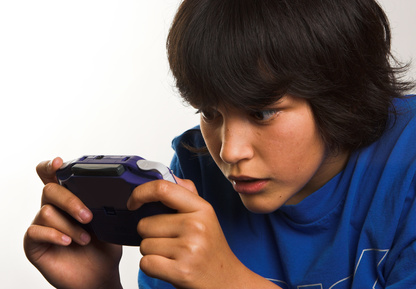Parents frequently ask me about video games and ADHD. Some have concerns that video games cause ADHD, others wonder how their children with ADHD can benefit from video games. One common sentiment I hear about video games and ADHD is “my child couldn’t possible have ADHD, he can spend hours playing video games”. Parents of children diagnosed with ADHD, or even modest attentional problems,commonly observe that those same kids are quite capable of paying attention to video games and other forms of digital media for extended periods of time. In good part, this is due to the highly stimulating, multimodal, immediate feedback that they experience in game play. If teachers provided the same kind of interactive and immediate feedback, these children would likely pay better attention in class, too.
Sometimes, however, this level of focus can be a problem, particularly for those children who use video games and the Internet as their go-to distraction devices. That said, the sustained effort and attention engendered with video games and ADHD children can be an asset for learning. Simply put, the more engagement, attention and sustained effort that an individual gives to a task, the more they learn, absorb, and remember. Finding video games and other screen-based technologies that will actually teach your child with ADHD something useful is the key. The following are a few general strategies that can help get the most out of your child with ADHD’s interest in video games.
Tips for Managing Video Games & ADHD:
1.) Play active games. Choose Active Games that require the use of physical exercise. CHoose games that utilize the Nintendo Wii Remote, Play Station Move, and Microsoft Kinect that involve high levels of physical activity. Vigorous physical exercise has been demonstrated to help improve attention. If your child demonstrates the capacity to transition from game play to schoolwork, it may even be useful to have him play an active video game prior to doing homework.
2.) Make games a reward. Use access to video games as a reward for good behavior. Letting your child have some extra game-time after doing something positive can be a great opportunity for him to relax and enjoy the fruits of his labor. However, we make this suggestion with caution, as you don’t want him to expect extra game time for every productive thing he does, or simply for “not being bad”.
3.) Use games to practice Self-Control. Use your child’s interest in video games to teach methods of Self-Control. Many children with ADHD not only have difficulty with regulating their patterns of behavior, but also with handling their emotions. Video games can often be extremely challenging, even frustrating, so monitoring your child’s time spent playing video games is a good opportunity for teaching helpful techniques in dealing with frustrations. One strategy is to establish a condition that your child may only play video games as long as he or she does not show severe displays of frustration. In addition, you can help him see how his persistence in overcoming obstacles and handling frustrations helps lead to success in video games and can also be used in day-to-day activities.
4.) Learn the tech behind games. Use your ADHD child’s interest in video games to help foster an understanding of computers and technologies. Encourage him to learn about these technologies in a way that will expand his interest into other fields. For example, help your child learn about video game design and programming. Programs such as Scratch, Gamestar Mechanic, Kodu, and Alice are incredible opportunities for learning.
5.) Embrace other forms of helpful digital media. Encourage your child to apply his interest in video games to the use of other healthy digital technologies. For example, many ADHD children could benefit from using organizers such as Evernote on their smartphones or tablets. ADHD children commonly experience difficulty with written expression and may benefit from the use of speech recognition and word-processing tools such as Dragon Dictation, Siri, and Google Drive as programs that help to enhance composition and typing skills.




